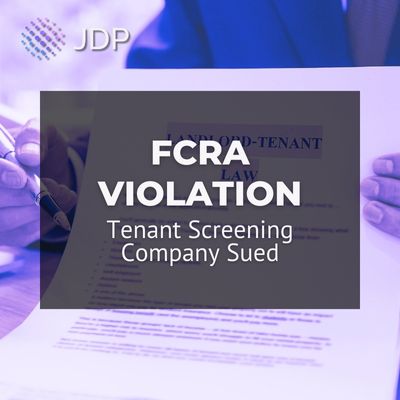July 2, 2024
A Pennsylvania court received a 16-page class action lawsuit against a company that furnishes tenant screening reports. The lawsuit alleged that the company provided outdated or incorrect information to landlords.
The suit described how the company sells the data it collects and compiles about consumers. Property managers or individuals leasing properties typically purchase these records and use them when choosing prospective tenants. The lawsuit also contends that the tenant screening company purchases incomplete, condensed information from third-party vendors.
This claim means they do not contact government offices and courthouses for updated data. Government offices and courthouses regularly update their records, such as withdrawn, satisfied, dismissed, and vacated eviction cases. These claims emphasized how the company offering tenant screening services delivers incomplete summaries. According to the complaint, the defendant knew and understood that its vendor regularly made mistakes when providing summarized information. As such, the defendant knew that the reports did not always offer updated information.
Additionally, the lawsuit contends that the company did not check official court documents when obtaining information. Instead, the company routinely published criminal records with no convictions and records over seven years old. These actions violated the Fair Credit Reporting Act (FCRA), which also requires companies that provide this type of information to ensure the maximum accuracy possible.
The original plaintiff explained how she received a rejection after applying to rent a home. This rejection happened due to two outdated pieces of information: Inaccurate data about an eviction and a criminal record over seven years old that did not result in a conviction. As such, the plaintiff suffered emotional distress and damage to her reputation. She emphasized how these damages occurred due to “inaccurate and defamatory reporting.”
The lawsuit would represent people in the U.S. or its territories impacted by the defendant’s screening reports within the last five years. Such impacts include evictions that the company did not provide details on. The company should have included whether the action reached an agreement, withdrawal, dismissal, or resulted in a tenant-favored judgment.
The suit may also represent others harmed by the company’s negligence. For example, those who suffered when the company submitted outdated reports to third parties, such as information over seven years old. Another example concerns criminal records that do not include a reported conviction. Finally, the lawsuit could represent anyone who requested information from the company within the last five years. It would cover those who received a communication that “did not identify the original and any intermediate vendor source(s) from which the company obtained the public record information referenced in the communication.”
